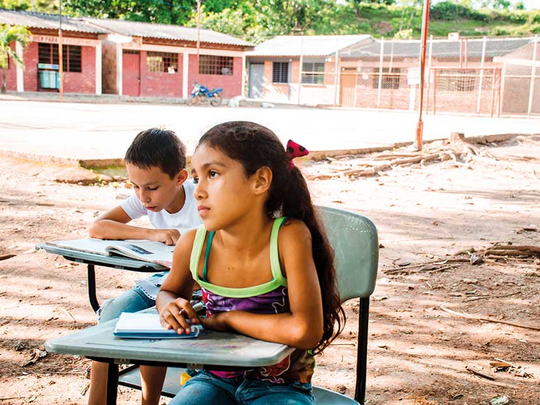
Dubai: Dubai Cares, part of Mohammad Bin Rashid Al Maktoum Global Initiatives, is working towards protecting and empowering thousands of vulnerable children caught in the midst of conflict in Colombia through a new Dh11-million programme.
The three-year programme, titled ‘Protecting Conflict-Affected Children and Youth through Education in Northeast Colombia’, stands to benefit 15,000 children and young people and 200 teachers.
The programme, launched by Dubai Cares in partnership with the Norwegian Refugee Council (NRC), aims to address four major challenges: the increasing number of out-of-school children and youth, low transition rates from primary to secondary schools, highly dispersed rural areas, and poor education quality.
Also, the programme will engage out-of-school children and youth through non-formal education and will provide technical support to the Secretariat of Education and schools to ensure educational services for such children.
It will span over 10 municipalities in the Catatumbo region, in Norte de Santander department and the Arauca department. Both departments have been impacted by armed conflict for many years, due to their strategic position on the Venezuelan border and the presence of guerrilla and paramilitary organisations, who have fought for control over illicit crops, weapons, contraband, and land.
Much of the two departments’ population lives in poverty, and children and young people attending school are exposed to risks including explosive devices, recruitment into armed groups, targeted killings, crossfire and kidnapping.
Annina Mattsson, programmes director at Dubai Cares, said: “We at Dubai Cares are continuously researching and identifying new interventions, particularly in countries affected by conflict, disasters, and epidemics, where we can support by addressing gaps where local governments have limited resources or incapacity to provide services. This programme, which falls under our Education in Emergencies strategy, intends to be a driver of lasting institutional, structural, and pedagogical change and improvement in the education framework of Norte de Santander and Arauca departments.”
Christian Vines, NRC country director, said: “In rural areas, the educational system is unable to guarantee both quality education and access to and regular attendance in school. Children’s homes are often long distances from schools; there are few teachers; uniforms and educational materials are very expensive for poor families; and family farming requirements force many children to leave school to help with the harvest. Many never return. This programme will bring hope to those who need it the most.”












